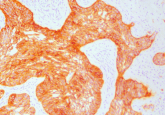CAP updates their guidelines for ‘Principles of Analytic Validation of Immunohistochemical Assays’

The College of American Pathologists (CAP) has revised the ‘Principles of Analytic Validation of Immunohistochemical Assays’ guidelines to improve the precision and accuracy of immunohistochemical assays in a clinical setting. This revision evaluates the evidence that has been published since the initial guideline was issued in 2014.
“This updated guideline provides new and revised recommendations for analytic validation/verification of immunohistochemical assays, which often guide therapeutic decision making for cancer treatment,” explains guideline Chair, Jeffrey D. Goldsmith, Fellow of the College of American Pathologists. “This guideline update serves to revise validation guidelines for all immunohistochemistry assays with particular focus on predictive markers; major changes to validation of immunohistochemistry assays performed on cytology specimens are also included.”
Although the majority of the original guideline statements remain unchanged, there are various new recommendations introduced to offer guidance on validating and verifying immunohistochemical assays conducted on cytology specimens, as well as predictive marker assays featuring distinct scoring systems, such as programmed death receptor-1 (PD-L1).
You may also be interested in:
- Immunohistochemistry-labeled biomarker panel could aid prostate cancer prognosis
- Brand-new guidelines announced for diagnosing Alzheimer’s disease
- Bioanalytical method validation guidance language: 10 years of progress
To ensure the initial analytic validation and verification of each clinical assay, laboratories should aim for a minimum of 90% overall concordance between the new assay and either of the comparator assay or expected results. The updated guidelines will also apply to estrogen receptor, progesterone receptor and human epidermal growth receptor 2 immunohistochemistry performed on breast cancer tissues.
“Although the systematic review did not identify substantive new literature, the numerical considerations and modeling discussed in the initial guideline document remains relevant,” states Goldsmith. “If validation/verification yields unexpected results, the causes should be investigated by the immunohistochemistry Medical Director.”
Following the update, a robust recommendation points to predictive marker assays like HER2 and PD-L1, where multiple scoring systems are in place. This additional recommendation specifies the need for separate validation and verification procedures, depending on the combination of the antibody clone and scoring system.
The College of American Pathologists has published their updated recommendations in an early online release in the journal, Archives of Pathology & Laboratory Medicine. The current tools, resources and information for the ‘Principles of Analytic Validation of Immunohistochemical Assays: Guideline Update’ are also available to view on the guideline webpage .






